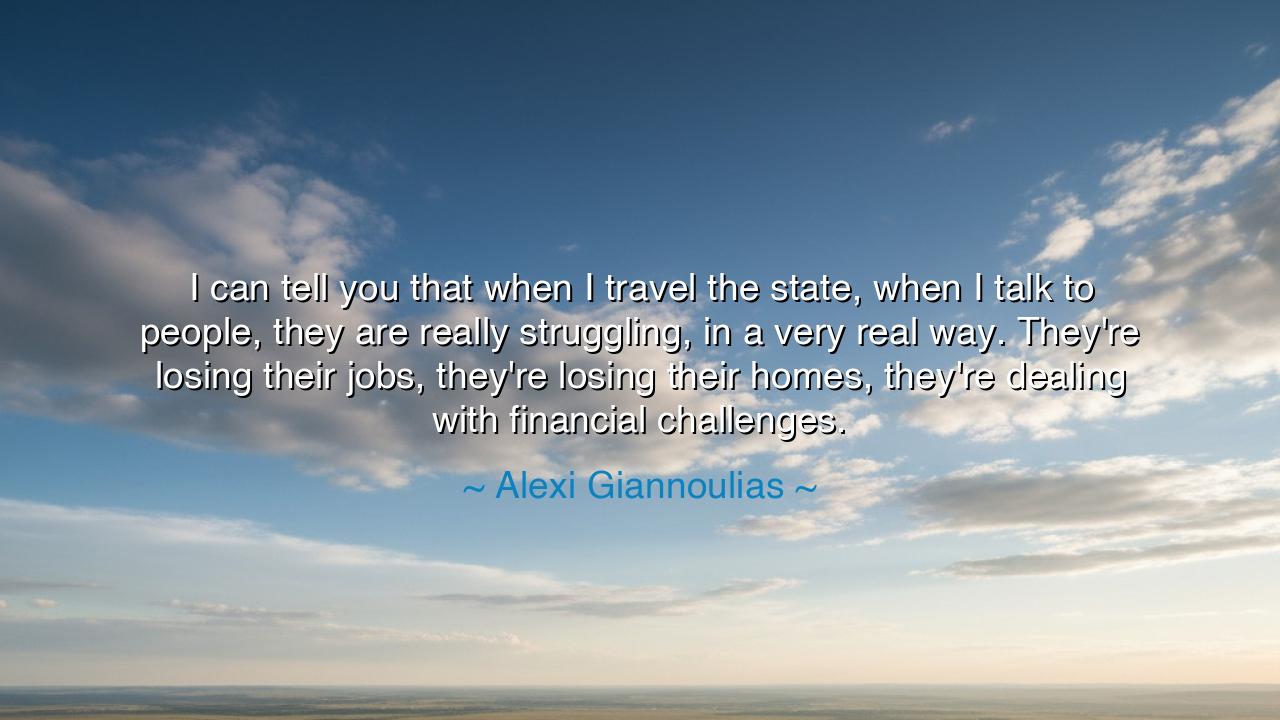
I can tell you that when I travel the state, when I talk to
I can tell you that when I travel the state, when I talk to people, they are really struggling, in a very real way. They're losing their jobs, they're losing their homes, they're dealing with financial challenges.






So spoke Alexi Giannoulias, a leader walking among the people of his state, bearing witness to their trials: “I can tell you that when I travel the state, when I talk to people, they are really struggling, in a very real way. They're losing their jobs, they're losing their homes, they're dealing with financial challenges.” His words strike with gravity, for they remind us that leadership is not forged in lofty chambers alone, but in listening to the cries of the people, in seeing their burdens, and in naming their pain with honesty.
To travel among the people is to step out of abstraction and into reality. Statistics on paper may reveal numbers, but the voice of the father who has lost his job, the tears of the mother who has lost her home, and the silence of the child who feels insecurity for the first time—these reveal the true weight of suffering. Giannoulias’ words echo the call of the ancients: that a ruler, a judge, or a steward of the people must walk among them, see their condition, and never forget that governance is for flesh and blood, not for symbols alone.
The theme of struggling is as old as humanity itself. When famine struck the land of Egypt, it was Joseph who stored grain beforehand, so that the people would not perish. His greatness lay not in wealth or title, but in foresight and compassion. Likewise, in Rome, the Gracchi brothers sought reforms to protect the common citizen, who was losing land and dignity in the face of economic change. They saw that when the people suffer without relief, the very foundation of the state trembles. History shows us again and again: leaders who hear the people and act with mercy strengthen their nations; those who ignore suffering bring ruin.
The mention of lost jobs and homes reveals more than economic hardship—it reveals a fracture in the fabric of human dignity. A job is not only wages, but purpose. A home is not only walls, but security, belonging, and rest. When these are lost, people feel stripped not only of comfort but of identity. The cry of Giannoulias is the cry of the prophet who warns: if we do not restore these foundations, despair will grow, and with despair comes unrest, anger, and hopelessness.
And yet, his words are not only a lament but a call. To speak of the people’s challenges is to demand that action be taken, that solutions be sought, that compassion be turned into policy. The leader who repeats the pain of his people gives voice to the voiceless. He becomes, as the ancients would say, the shepherd who guards his flock, walking with them through barren valleys, not abandoning them in their hour of need.
The lesson for us is clear: whether we lead nations, communities, families, or even only ourselves, we must open our eyes to the suffering around us. It is easy to turn away, to shield ourselves from discomfort, but true greatness lies in facing hardship honestly and responding with courage. Let us remember that every life we touch is a life with struggles unseen. In every conversation, in every encounter, we may be the one who listens, who encourages, who offers strength.
Practically, this means acting with compassion in daily life: support those who have lost work, give aid where you can, and speak with kindness to those weighed down with burdens. It means urging leaders to act justly, and refusing to let the pain of the many be forgotten in the comfort of the few. For when we lift even one soul from despair, we bring light into the darkness, and light multiplies.
Thus, Giannoulias’ words endure as a reminder and a charge: “The people are struggling.” Let us not look away. Let us listen, let us walk among them, and let us become builders of hope. For in the end, the greatness of any society is not measured by its wealth or monuments, but by how it responds when its people are in need. And those who bring comfort and justice in times of hardship will be remembered as true guardians of peace.






AAdministratorAdministrator
Welcome, honored guests. Please leave a comment, we will respond soon